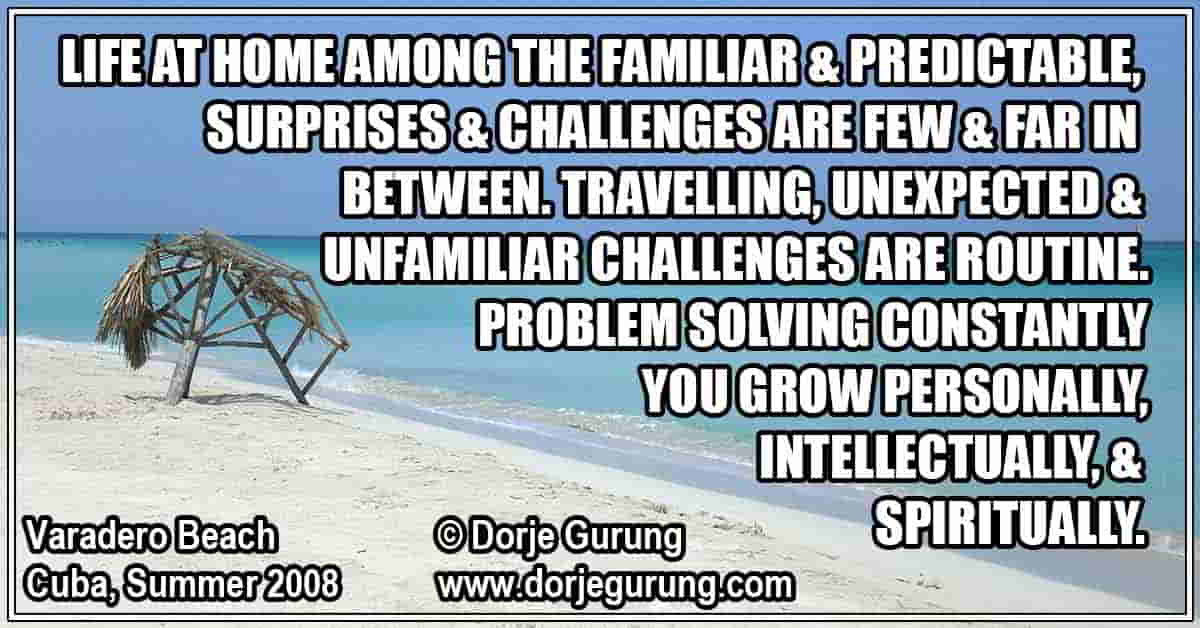Life at home among the familiar and predictable — people, culture, social and physical surroundings, expectations, routines etc. — surprises and challenges generally are few and far in between, unless you go in search of them or are on the lookout for.
When traveling however, unexpected and unfamiliar struggles and challenges are routine.
Unanticipated challenges — ones you don’t or won’t face when living in your own country — demands reactions, responses, solutions etc., a lot of times then and there. How you react to or tackle them; how you go about finding solutions to, or resolving, addressing, or finding ways around them — gives you insights into your own self. You come to know and learn about yourself — about who you are emotionally, mentally, intellectually etc. — more clearly, more authentically, more deeply. All that, in turn, expands and broadens your identity as well as increase your emotional strength.
Constantly problem-solving (resolving external or internal conflicts and issues, overcoming challenges); making decisions (small and big); constantly testing yourself (doing things you wouldn’t at home and availing yourself of opportunities not available at home) — you also grow intellectually and spiritually.
When travelling and/or living elsewhere, you regularly find yourself in situations where you don’t know or understand what’s going on or what you are supposed to say or do etc. because you are completely clueless about their culture, their customs, their beliefs, their protocols etc. You also find yourself questioning what or who you are and what you represent etc. when confronted by people who believe, think, and act differently, or when confronted by choices or opportunities you would have likely never encountered at home etc. Your reasons for feeling or being lost sometimes may be something as simple as a lack of a common language between yourself and the people around you.
A lot of times though, it’s when you are — or feel — lost that you find yourself…in places you would never chose or dare to venture. In the loss, then, is the find.
Your understanding of your self — what you want, need, value; your skills, your strengths and what you are good at; how you feel about a lot more things etc. — changes, improves, grows, expands, and consolidates. You develop a growth mindset! Self-monitoring skills improve.
Living among a completely different people, most importantly, shapes and transforms you like nothing else: they engender deep personal feelings about — and for — life in general and our planet.
If this pandemic so far has taught us anything, we must be able to rise above the severely limited identity our culture, society, country, or religion imparts to us, or instills in us.
To become much MUCH more and to get much MUCH farther in life than you are imagining; to rise above the constraints and limitations of your jaat, your caste, your race, your nationality, your gender, your people in general — break out of your own people’s fears of others and your culture‘s boundaries, AND venture beyond the confines of your country’s borders. I mean that both literally and figuratively, of course!
But, what if you don’t have the option (because of coronavirus pandemic) or the means to travel?
Most countries are pretty highly diverse. Take for instance my own country like Nepal! We have enough differences and variations among people — like in the ethnicity they belong (126 are represented in the country), in the languages they are able to speak (about 123), in the sub-cultures they are part of or represent etc. Should you really choose to challenge yourselves to grow because, unlike a majority of Nepalis, you already have a growth mindset, try DELIBERATELY to learn about a different people with an open heart and mind, and you will grow.
Seek out and engage with those you normally don’t — like strangers, those from a different ethnicity, caste, sex, gender, sexual orientation, age, class, or from a different profession, different official position, or title etc.
And when you do, most importantly, LISTEN!
If you are a young Nepali, whatever you do, do NOT fall into the trap of listening to and following the advice of closed and inward-looking old Nepali men. Most of them will have already lived their confined, constricted, and constrained lives. You have yours to live and learn about as well as from!
What do you think?

